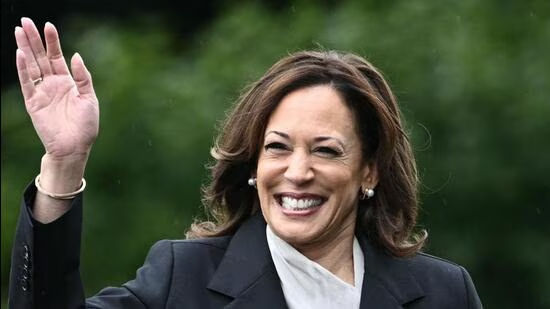Harris candidacy: The possible benefits, the potential risks
Washington: Kamala Harris’ possible nomination as the Democratic nominee for president has the potential of unifying the Democratic base, bringing the young voters disillusioned with Joe Biden back to the tent, leading to historic levels of Black electoral consolidation, making abortion the centre piece of the election, and upending the entire Republican campaign that was centred on Biden’s age and record.

Harris’s possible nomination also runs the risk of alienating independent voters who neither know her well enough nor are persuaded by her record or image. It has the ability to let Republicans mobilise the White male working class vote in swing states that may not relate with her on gender and identity grounds. It can lead to Democrats getting stuck with a candidate who has been caricatured for being responsible for both the crisis at the border with a spike in illegal immigration and the rise of “wokeism”.
And it leaves Harris with just over four months to unify the party, win over skeptics, raise funds, fashion a narrative, and defeat a former president who has just had a series of legal wins, survived an assassination attempt, fully taken control of his party, and heralded a Far-Right movement that promises to reshape America.
It is in this toss-up between the potential benefits, and the clear risks, that her candidacy represents that the future of an already unprecedented American election rests.
The potential benefits
The first thing that a Harris candidacy does is bring back hope to a Democratic Party that had resigned itself to an almost certain defeat if Joe Biden remained on top of the ticket. Donors, party representatives, voters, sympathetic media columnists had all written off Biden’s prospects after his disastrous debate performance.
Just having Harris as the potential nominee has suddenly infused the party with energy and hope; it has also neutralised the age argument for Trump, at 78, is now the oldest ever candidate to run for president while Harris, who will turn 60 in October, represents the generational shift in US politics. And it has got the donors back, with Harris raising an astounding $50 million in less than 24 hours.
Two, Harris’s candidacy can bring what had become a fragmented and demoralised base back to the party tent. This includes young voters who have been furious with Biden for his support to Israel. Harris has maintained some distance from that policy and spoken of the humanitarian situation in Gaza, which may appeal more to progressives than Biden’s position did. But Harris also has another less talked-about out advantage. She is married to a Jewish-American, which means that she has space to critique Israel without immediately being labeled as anti-Semitic.
Three, Harris’s candidacy can lead to a historic electoral consolidation of the Black community that identifies with her, and who she identifies with. In conversations last week in Milwaukee with a set of Black activists, it was apparent that for them, if Biden wasn’t the candidate, there was no question that it should be Kamala Harris. Black men, who have shown signs of moving to Trump, may also find a reason to stick to the Democratic ticket. Like 2008, the community can see the possibility of history being made.
And as Angela Lang, a local Wisconsin community organiser, told HT, given that the stakes in the election were so high and revolved around stopping Trump for many, she hoped that the traditional barriers of race and gender may not block Harris in the same way as it may have during a normal election.
Four, Harris has been the administration’s most effective spokesperson against the Supreme Court’s decision to overturn Roe v Wade, and with it, the national protection to abortion. There is also clear evidence, based on the midterm polls and referendums in even Republican states, that a majority of voters are upset with this reversal of abortion rights. The Democrats have made this the centre piece of the campaign. And it is one issue where Republicans find themselves on the defensive.
Trump wishes to take credit for the overturning of abortion because his nomination of Supreme Court judges enabled it, but he has been cautious for he knows that speaking about it can alienate voters; he also rejected a demand from his own party’s base to have a national ban on abortion and has made it a state issue. Given this room to be aggressive on the issue, and to appeal to suburban women, an important voting bloc, a Harris candidacy has a clear advantage.
And finally, for months, if not since 2020, Trump has prepared for a contest with Biden. After the debate on June 27 when Biden’s deficits got exposed, Republicans were hoping that he would stay on the ticket. Having Harris now means that they have to change their entire strategy and messaging. Do they portray Harris as a strong and devious political player or someone who is weak and incompetent?
Does the balancing act that the Republicans were attempting on abortion become more challenging? Does the possible inroads the party was making into the Black vote halt? Will it choose to embark on an even more strongly White majoritarian platform? It is a moment of delicious irony for some that Trump had in fact donated to Harris’s California attorney general election run back in early 2010s. None of these are impossible puzzles but it does require a full recalibration of strategy, giving Democrats breathing space.
The clear risks
At the same time, the risks of a Harris candidacy for Democrats are clear.
For one, she has just over 100 days to do the following — select a running mate, win the party’s nomination, continue to raise funds, construct a new campaign based on her personality and message, plan an advertising and publicity blitzkrieg both in swing states as well as blue states that had suddenly become vulnerable with Biden’s weaknesses, and sustain a campaign infrastructure down to the ground.
And she has to introduce herself to Americans who may know her name but don’t know her well enough to vote for her or have, so far, not found her “authentic” and “likable”, two terms that are used to describe what she lacks, though her supporters are quick to suggest how sexism and misogyny is behind these critiques.
Two, her vice presidency may have catapulted her to this position but has been a mixed bag. To be sure, the nature of the office makes almost all office-holders seem either partly unemployed or weak. But Harris’s initial missteps in her public statements, a reputation of being a difficult manager with a high rate of attrition among staff, the difficulty in articulating a clear policy niche till she embraced the abortion issue eroded her political stock among DC’s insiders.
She has the advantage of owning Biden administration’s substantial achievements, but as one voter in Milwaukee said recently, “I don’t quite know what she has done, what she does, what she will do”. That’s not a happy position for a candidate to be in four months before polls.
Three, Harris is confronting a Republican machine that has made immigration its single most important campaign issue; it “is at the heart of our platform”, as Trump said at the convention. She has two challenges. Given the racist subtext at play in the discourse, as the child of immigrants herself, she has to reach out to skeptical White voters and convince them that she is committed to American sovereignty.
And she has to counter the Republican narrative that she was the “border czar” under Biden — a label born out of Biden’s decision to ask her to examine underlying roots of the migration crisis in Central and South America — and was therefore complicit in the “invasion of illegal aliens”.
Her possible nomination is a sign from Democrats that they won’t be apologetic about where they stand on minorities and representation and immigration, but how they marry this ideological clarity with electoral tactics in order to win over moderate votes will be key.
Four, Trump’s entire campaign is based on being a strongman. The fact that former wrestler Hulk Hogan or the head of the Ultimate Fighting Championship introduced him at the convention was no coincidence; the idea was to portray how Trump was the toughest man they knew.
Trump’s image after the assassination bid, of instinctively standing up, pumping his fist and giving a call to “fight, fight” has played a big part in reinforcing this image. In this backdrop, Republicans will cast Harris as weak. Her gender will, if not officially but informally, be used against her. The Right’s campaign will focus on how an America in decline and a weak America being laughed at by adversaries - Trump’s campaign tropes — cannot afford a woman president. To win over male votes in a country that has yet to elect a woman president is a clear challenge for Harris.
Kamala Harris has already made history in her life, as the first Indian-American senator, as only the second Black woman senator, as the first woman vice president and the first VP from the African-American and Asian-American community, and now, in all likelihood, as the first woman of her background to be the Democratic nominee for president. But if she does manage to pull off a surprise in November, by building on her advantages and offsetting the challenges, Harris will go down in American history as a giant and a legend.
Disclaimer: The copyright of this article belongs to the original author. Reposting this article is solely for the purpose of information dissemination and does not constitute any investment advice. If there is any infringement, please contact us immediately. We will make corrections or deletions as necessary. Thank you.
Title:Harris candidacy: The possible benefits, the potential risks
Url:https://www.investsfocus.com



